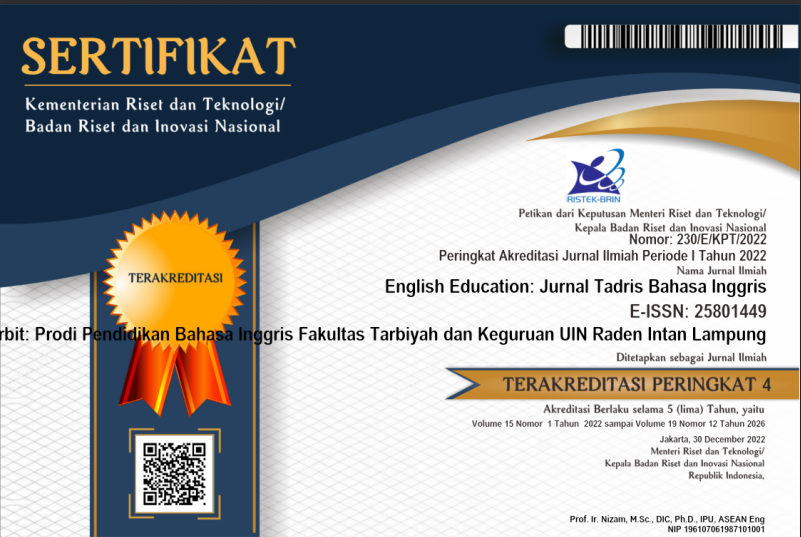Drilling Technique : A study of Improving Speaking Skill for Non Scholars in Short Term
Abstract
Non scholars people are very few to get assistive knowledge about English to compete in industrial world. ASEAN Economic Community (AEC) obviously focuses on transactional communication for trading purpose which could be assumed that lacking ability to master English will impact on less opportunity to earn living. Those non-scholars are, for example, becak driver, security, retail store seller, fruit seller, and some others in which they run business for their daily needs without having English communication competencies. However, these non-scholars seem to be neglected from government attention or related authority worker. The purpose of this research is to investigate whether drilling technique is applicable to improve speaking skills for non-scholar. It is believed that most non-scholar needs are speaking skill rather than other skills.
Using Action Research design, the non-scholar would be given assistive teaching learning based on the needs for their daily profession. For the learning improvement, the non-scholar will be handed with a booklet which covers some materials based on the needs of their profession. This investigation involves four non-scholars from different profession such as fruit seller, security, fried rice seller, and waitress. All participants are men with age between 40 to 45 years which English was being taught when they were in Senior High School. The results of this study will not only figure out the impact of drilling technique for speaking skills but also determine the appropriate drilling technique for particular group of non-scholars. Besides, without sufficient knowledge in English, those target learners could actively communicate in English only in 2 (two) weeks.
Full Text:
PDFReferences
Ari, D., Jacobs, L. C., Sorensen, C., & Razavieh, A. (2010). Introduction to research in
education. America: Wordswort Group.
Brown, H. D. (2004). Language assessment: Principles and classroom practices. Allyn & Bacon.
Cohen, L., Manion, L., & Morrison, K. (2013). Research methods in education. Routledge.
Fraenkel, J. R., Wallen, N. E., & Hyun, H. H. (1993). How to design and evaluate research in
education (Vol. 7). New York: McGraw-Hill.
Harmer, J. (2001). English language teaching. Harlow: Pearson Education Limited.
Maro, Rahmawati Khadijah. (2016). Project Based Learning: Study on Vocational English to
Teach Non-scholar. TEFLIN Proceeding. Universitas Adibuana Surabaya
Richards, J. C., & Renandya, W. A. (2002). Methodology in language teaching: An anthology of
current practice. Cambridge university press.
DOI: http://dx.doi.org/10.24042/ee-jtbi.v11i1.2674
English Education: Jurnal Tadris Bahasa Inggris, UIN Raden Intan Lampung is licensed under a Creative Commons Attribution-ShareAlike 4.0 International License. pISSN: 2083-6003, eISSN: 2580-1449.









